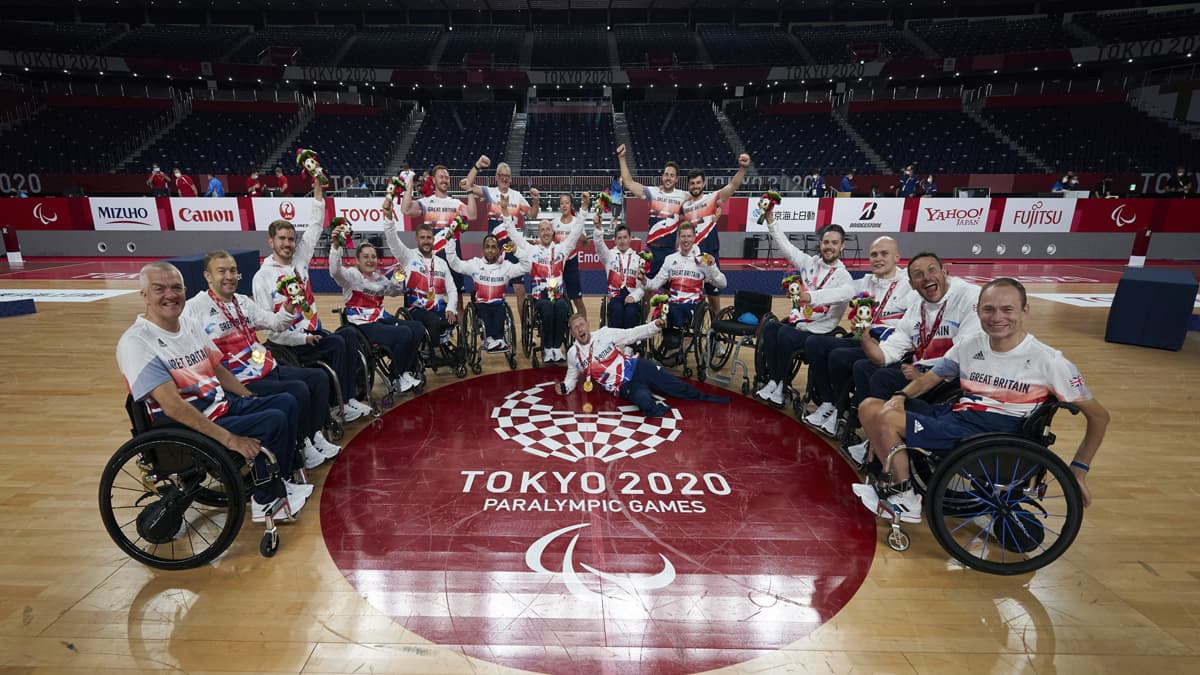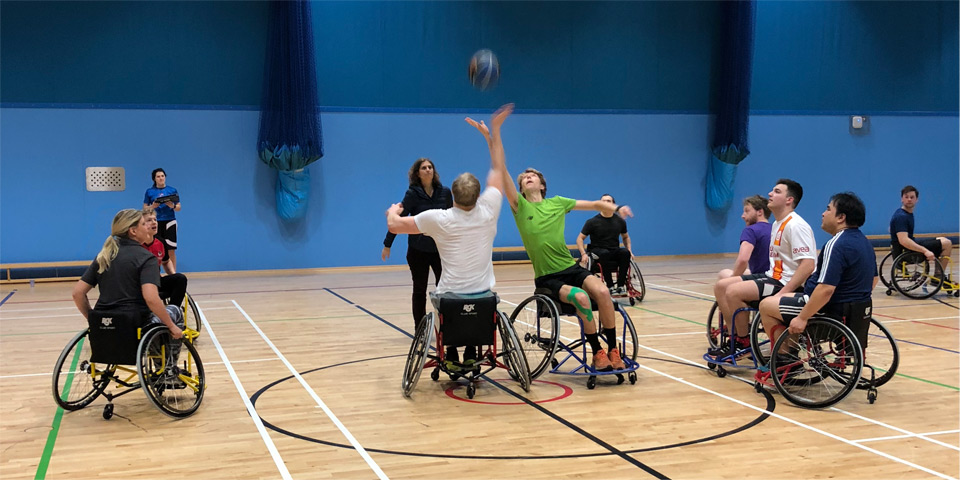About us
Directed by Prof Vicky Tolfrey, the Peter Harrison Centre for Disability Sport (PHC) was established in 2005 and is an internationally renowned Disability Sport Research Centre. Our research focuses on two themes; Sports Performance and Health & Wellbeing.
The centre is heavily involved in research at both an elite performance and rehabilitative level. We provide sport science support to a number of GB squads, in addition to working closely with a number of National and International partners and collaborators to achieve their key aims and objectives.
We would like to express our gratitude to the Peter Harrison Foundation and the School of Sport, Exercise and Health Sciences at Loughborough University for their continued support.
History
In 2004, a team from Loughborough University negotiated a grant from the Peter Harrison Foundation to establish a Centre for Disability Sport. The Foundation, at that time, had been sponsoring athletes with a disability at Loughborough, including Daniel Greaves, a Sport and Exercise Science student who went on to win the discus at the 2004 Paralympic Games in Athens, along with a world record.
Interested in making a significant difference in research and practice, Professor Stuart Biddle and sport fundraiser Lisa Farmer, supported by the then Vice-Chancellor, Professor Sir David Wallace, negotiated a comprehensive proposal for about 18 months. Professors Clyde Williams and Barrie Houlihan also had significant inputs.
The Centre was formally established in 2005 and titled The Peter Harrison Centre for Disability Sport (PHC), with Ken Black appointed as the Director (2005-2007). Professor Vicky Tolfrey, the current Director since 2007 has developed the Centre into an internationally regarded leader in the area of Para Sport and Sports Science. The PHC has a thriving and productive academic unit with engaged staff and students, and a committed benefactor. Dr David Howe also contributed to some earlier activities of the PHC.
Recognition of Vicky’s strong leadership of the PHC and her own research agenda was made by the International Paralympic Committee (IPC), where Vicky received the 2017 IPC Scientific Award in recognition of her commitment to Paralympic research [view the full article].
The Psycho-social Health and Well-being research strand was led by Professor Brett Smith during his time at Loughborough University (2009-2015) and provided an important complement to the work conducted in the Sport Science strand. This was evident with funding received via the Coca-Cola Foundation (2011-2014) which provided a foundation to integrate work across the exercise continuum and increase the staffing base with the appointment of Dr Anthony Papathomas.
Currently, there are two research strands, ‘Sport Performance’ led by Vicky, with significant contributions being made within ‘wheelchair sport’ and ‘Paralympic classification’ by and ‘Health and Wellbeing’ which is led by Dr Christof Leicht. The PHC team has increased in size and strength over the years and currently has over 20 members (Lecturers, research staff and research students) across various disciplines and with diverse research interests and international visiting appointments. It is clear from the PHCs national and international collaborations, invited presentations, publication records and grant success that the PHC has an international reputation.
Missions, Aims and Objectives
Our mission
To improve knowledge about Paralympic sport and to promote the substantial health and quality of life benefits that can be gained through participation in disability sports.
Our aims
- Generate and extend the knowledge in disability sport through applied research
- Assist in the development of evidence-based practice in disability sport and leisure
- Ensure that significant research findings are translated into practical outputs and guidelines that help inform disability and medical practitioners attached to sports / rehabilitation centres both in the UK and Internationally
- Enhance the National and International focus for disabled sport and leisure
- Ensure that information and support is provided through the PHC website, newsletters, seminars / workshops and Twitter
Our objectives
To improve knowledge and understanding of Paralympic sport. As well as researching high performance disability sport, the PHC will promote the substantial health and quality of life benefits that can be gained through participation in grassroots disability sport and physical activity.
This will be achieved through educational initiatives and applied collaborative research projects coordinated by experts from the sports and social sciences within the School of Sport, Exercise and Health Sciences (SSEHS) at Loughborough University.
Privacy Policy
At the Peter Harrison Centre for Disability Sport we’re committed to protecting and respecting your privacy.
This policy explains when and why we collect personal information about you, how we use it, how we keep it safe and secure and your rights and choices in relation to your information.
Any questions regarding this policy and our privacy practices should be sent by email to PHC@lboro.ac.uk
How do we collect information from you?
We obtain information from you in the following ways:
Information you give us directly
For example, we may obtain information about you when you take part in one of our events, or when you register to receive one of our newsletters.
When you visit this website
We, like many organisations, automatically collect the following information:
- technical information, including the type of device you’re using, the IP address, browser and operating system being used to connect your computer to the internet. This information may be used to improve the services we offer.
- information about your visit to this website, for example we collect information about pages you visit and how you navigate the website, i.e. length of visits to certain pages, products and services you viewed and searched for, referral sources (e.g. how you arrived at our website).
We collect and use anonymous information by using cookies on our website – more information can be found under the ‘Cookies’ section further below.
Social Media
When you interact with us on social media platforms such as Facebook and Twitter we may obtain information about you (for example, when you publicly tag us in a photo). The information we receive will depend on the privacy preferences you have set on those types of platforms.
What type of information is collected from you?
The personal information we collect when you sign up to our services include:
- your name
- email address
How and why is your information used?
We may use your information for a number of different purposes, which may include:
- sending you communications which you have requested and that may be of interest to you (e.g. biannual PHC newsletter)
- conducting analysis and market research so we can understand how we can improve our information, services or products
- seeking your views or comments on the services we provide
- notifying you of changes to our services.
Who has access to your information?
We do not sell or rent your information to third parties.
We do not share your information with third parties for marketing purposes.
Your choices
You have a choice about whether or not you wish to receive information from us. If you no longer want to receive communications from us, you can unsubscribe by emailing PHC@lboro.ac.uk or by clicking on the ‘Unsubscribe’ link at the bottom of an email from us.
You can also change your preferences at any time by emailing PHC@lboro.ac.uk
Right of access
You have a right to request access to the personal data that we hold about you. You also have the right to request a copy of the information we hold about you, and we will provide you with this unless legal exceptions apply.
If you want to access your information, please email PHC@lboro.ac.uk
Cookies
Why we use cookies
We use different types of cookies for a variety of reasons, to:
- make the website work as you'd expect
- remember your preferences during and between visits
- collect anonymous data that helps the University improve the website
- highlight relevant information to you via our online marketing activities.
How to opt out of or block cookies
You can restrict or block cookies by adjusting your browser's settings. Doing so however can limit the functionality of our website. Please check your browser's help guide on how to do this. Websites such as www.allaboutcookies.org provide further information on how to opt out of or block cookies.
Types of cookies we use
Some of our webpages include functionality provided by third party services such as social networking and video. Our site includes the following which use cookies:
Performance cookies
We use Google Analytics to monitor visitor behaviour to help us improve the user experience and the online services we offer. The data collected is anonymised and cannot be used to identify you personally.
Links to other websites
Our website may contain links to other websites run by other organisations. This policy applies only to our website‚ so we encourage you to read the privacy statements on the other websites you visit. We cannot be responsible for the privacy policies and practices of other websites even if you access them using links from our website.
In addition, if you linked to our website from a third party site, we cannot be responsible for the privacy policies and practices of the owners and operators of that third party site and recommend you check the privacy policy of that site.
Changes to this policy
Any changes we may make to this policy in the future will be posted on this website so please check this page occasionally to ensure that you’re happy with any changes. If we make any significant changes we’ll make this clear on this website.
Review of this policy
We keep this policy under regular review. This policy was last updated in July 2018.

